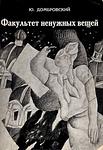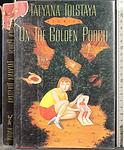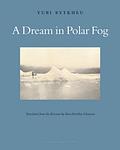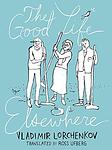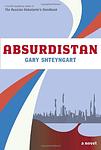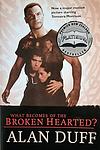The Greatest New Zealander, Russian "Fiction" Books Since 1950
Click to learn how this list is calculated.
This list represents a comprehensive and trusted collection of the greatest books. Developed through a specialized algorithm, it brings together 300 'best of' book lists to form a definitive guide to the world's most acclaimed books. For those interested in how these books are chosen, additional details can be found on the rankings page.
Genres
Countries
Date Range
Reading Statistics
Click the button below to see how many of these books you've read!
Download
If you're interested in downloading this list as a CSV file for use in a spreadsheet application, you can easily do so by clicking the button below. Please note that to ensure a manageable file size and faster download, the CSV will include details for only the first 500 books.
Download-
26. The Faculty of Useless Knowledge by Yuri Dombrovsky
"The Faculty of Useless Knowledge" delves into the life of a historian caught in the oppressive atmosphere of Stalinist Russia. The narrative explores the intellectual and emotional turmoil of the protagonist, who is ensnared in the brutal machinery of the Soviet state's ideological and bureaucratic control. Through his experiences and reflections, the book examines themes of memory, history, and the struggle to maintain intellectual integrity in a repressive society. The protagonist's journey is a poignant commentary on the value of knowledge and the human spirit's resilience against totalitarian forces.
-
27. The Zone by Sergei Dovlatov
"The Zone" is a semi-autobiographical novel that follows the life of a writer who is confined to a Soviet labor camp. Through a series of vignettes, the protagonist reflects on his experiences in the camp, the absurdities of the Soviet system, and the struggles of maintaining his identity and integrity in the face of oppression. With dark humor and sharp observations, the book offers a poignant and satirical portrayal of life in the Soviet Union.
-
28. Farewell To Matyora by Valentin Rasputin
The book is a poignant exploration of the tension between progress and tradition, set in a small Siberian village that is doomed to be submerged by the construction of a hydroelectric dam. As the government mandates the relocation of the village's inhabitants, the narrative delves into the lives of the villagers who are grappling with the loss of their ancestral home and way of life. The story is a meditation on the cost of modernization, the deep connection between people and their land, and the inevitable passing of time that brings change, often at the expense of cultural heritage and personal identity. Through the villagers' resistance and sorrow, the novel examines themes of environmental impact, the clash of ideologies, and the resilience of the human spirit in the face of displacement.
-
29. Pushkin House by Andrey Bitov
The novel in question is a complex and multi-layered exploration of Soviet intellectual life, following the story of a literary scholar who becomes deeply entangled in his research on the life of a fictional 19th-century Russian poet. As the protagonist delves into the poet's work and biography, his own life begins to mirror the subject of his study, leading to a blurring of past and present, reality and fiction. The narrative weaves together themes of identity, history, and the power of literature, all set against the backdrop of the oppressive atmosphere of the Soviet Union, where the quest for personal and artistic freedom is fraught with peril and contradiction.
-
30. Badjelly The Witch by Spike Milligan
The book is a whimsical children's story that follows the adventures of siblings Tim and Rose as they search for their lost cow, Lucy. Their quest leads them into an enchanted forest where they encounter a host of magical creatures, including giants, a fairy, and an evil witch named Badjelly who can turn people into sausages with her magic wand. With courage and the help of their new fantastical friends, the children must outwit Badjelly and rescue their beloved cow, embarking on a journey filled with humor, whimsy, and the triumph of good over evil.
-
31. Pushkin Hills by Sergei Dovlatov
The book is a tragicomic novel that follows the story of an unsuccessful writer and divorced father who takes a summer job as a tour guide at the rural estate of a famous Russian poet. As he immerses himself in the petty concerns and daily life of the museum staff and local villagers, the protagonist grapples with his own literary ambitions, the complexities of his personal life, and the cultural legacy of the poet whose memory he is charged with preserving. The narrative is infused with sharp wit and a deep sense of irony as it explores themes of artistic integrity, cultural heritage, and the absurdities of Soviet life.
-
32. On The Golden Porch by Tatyana Tolstaya
"On The Golden Porch" is a collection of short stories that delve into the lives of various characters in Soviet Russia, exploring themes of memory, history, and the complexities of human experience. The narrative weaves through the mundane and the extraordinary, painting vivid portraits of individuals as they navigate the peculiarities of their existence. With a blend of magical realism and sharp social observation, the stories capture the essence of Russian culture and psyche during a time of great change, revealing the resilience and richness of the human spirit in the face of the absurdities of life.
-
33. Medea And Her Children by Lyudmila Ulitskaya
"Medea And Her Children" by Lyudmila Ulitskaya is a powerful and emotionally charged novel that delves into the complex relationships between a mother and her children. Set in Soviet Russia, the story follows the lives of three generations of women as they navigate the challenges of love, sacrifice, and the oppressive political climate. Through vivid and compelling storytelling, Ulitskaya explores the universal themes of family, loyalty, and the enduring strength of a mother's love.
-
34. The Luminaries by Eleanor Catton
Set during the New Zealand Gold Rush of the 19th century, this novel follows Walter Moody, a prospector who stumbles upon a secret meeting of twelve local men who are trying to solve a series of unsolved crimes. As the story unfolds, it becomes clear that the crimes, which include a rich man's disappearance, a prostitute's attempted suicide, and a huge fortune found in a drunkard's cottage, are all interconnected. The novel's complex narrative structure, which uses astrology to organize its characters and events, adds another layer of intrigue to the story.
-
35. The Time: Night by Ludmila Petrushevskaya
The book is a stark portrayal of the struggles faced by a multi-generational family living in the cramped quarters of a Moscow apartment during the twilight years of the Soviet Union. The narrative is driven by the matriarch, a poet who is both resilient and weary, as she navigates the complexities of caring for her mentally unstable daughter and her neglected grandson. The story delves deep into themes of maternal sacrifice, poverty, and the relentless passage of time, painting a grim picture of domestic life and the burdens of womanhood in a society that is as unforgiving as it is oppressive.
-
36. Hurramabad by Andrei Volos
"Hurramabad" is a gripping and thought-provoking novel set in contemporary Russia. The story follows the lives of three young men who find themselves entangled in a web of corruption, violence, and political intrigue in the city of Hurramabad. As they navigate through the complexities of power and loyalty, the characters are forced to confront their own moral dilemmas and make difficult choices that will shape their futures. With its vivid portrayal of a corrupt society and its exploration of themes such as friendship, love, and the pursuit of justice, "Hurramabad" offers a compelling and immersive reading experience.
-
37. The Stories of Vladimir Nabokov by Vladimir Nabokov
This collection showcases the unique storytelling abilities of a renowned author, exploring a variety of themes and settings through 65 different tales. The stories range from brief, whimsical observations and elaborate fantasies to deeply emotional narratives and intellectual puzzles. The author's distinctive style, marked by rich imagery, intricate plots, and playful language, is evident throughout, making the collection a testament to his literary prowess and creativity.
-
38. You Cried Bitterly In Your Sleep by Yuri Kazakov
The book is a collection of short stories that delve into the complexities of human emotions and relationships, set against the backdrop of Soviet Russia. Through a series of poignant narratives, the author explores themes of love, loss, and the struggle for personal identity amidst societal expectations. The characters in these stories confront their deepest fears and desires, often finding themselves in situations that challenge their moral compass and force them to reckon with the harsh realities of their lives. The title story, in particular, captures the essence of the collection, depicting a moment of vulnerability and the profound impact of dreams on one's waking life.
-
39. A Dream In Polar Fog by Yuri Rytkheu
"A Dream In Polar Fog" is a captivating and poignant tale that follows the journey of John MacLennan, a Scottish whaler who becomes stranded in the Arctic. As he navigates the harsh and unforgiving landscape, MacLennan encounters the indigenous Chukchi people and forms a deep bond with a young Chukchi boy named Khariton. Through their shared experiences and cultural exchange, the novel explores themes of identity, survival, and the power of human connection amidst the backdrop of the Arctic wilderness.
-
40. The Good Life Elsewhere by Vladimir Lorchenkov
"The Good Life Elsewhere" is a darkly humorous and satirical novel that follows a group of Moldovan villagers who embark on a chaotic journey to Italy in search of a better life. Through their misadventures, the author exposes the harsh realities of poverty, corruption, and the desperate measures people are willing to take in pursuit of a brighter future. With a blend of absurdity and poignant social commentary, the novel offers a compelling exploration of the human condition and the universal desire for a better life.
-
41. Klotsvog by Margarita Khemlin
"Klotsvog" is a poignant and introspective novel that follows the life of Maya Abramovna Klotsvog, a Jewish woman living in Soviet Russia during the 20th century. Through Maya's perspective, the book explores themes of identity, love, and the struggles faced by Jews in a society plagued by anti-Semitism. With a blend of humor and tragedy, the story delves into Maya's personal relationships, her experiences as a mother and wife, and her resilience in the face of adversity. Ultimately, "Klotsvog" is a profound exploration of one woman's journey through life and her unwavering spirit in the midst of societal challenges.
-
42. There Once Lived A Woman Who Tried To Kill Her Neighbour’s Baby by Ludmila Petrushevskaya
In this collection of dark and haunting tales set in Soviet Russia, Ludmila Petrushevskaya explores the depths of human desperation and the complexities of human relationships. Through her vivid and evocative storytelling, she delves into the lives of ordinary individuals who are trapped in a web of loneliness, despair, and unfulfilled desires. With a blend of realism and the supernatural, Petrushevskaya crafts a mesmerizing narrative that exposes the raw emotions and hidden secrets that lie within the human heart.
-
43. The Sacred Book Of The Werewolf by Victor Pelevin
This novel introduces readers to a captivating world where ancient myth meets modern life through the eyes of a two-thousand-year-old werefox named A Hu-Li. Disguised as a teenage girl, she navigates contemporary Russia, using her supernatural abilities and seductive powers to survive in a society dominated by men. Her life takes a dramatic turn when she falls in love with a werewolf, a figure representing the novel's exploration of themes such as identity, transformation, and the search for spiritual enlightenment. Set against the backdrop of post-Soviet Russia, the narrative delves into philosophical discussions, blending Eastern philosophies with the complexities of modern existence, all while maintaining a sharp sense of humor and a deep sense of mysticism.
-
44. Roadside Picnic by Arkady Strugatsky, Boris Strugatsky
"Roadside Picnic" is a science fiction novel set in a post-apocalyptic world where mysterious extraterrestrial visitors have left behind dangerous and enigmatic zones known as "Visitation Zones." These zones are filled with hazardous artifacts that grant strange and unpredictable powers to those who come into contact with them. The story follows Redrick Schuhart, a "stalker" who ventures into the zones to retrieve valuable artifacts while navigating the treacherous landscapes and facing the moral dilemmas that arise from the desperate and corrupt society in which he lives.
-
45. Absurdistan by Gary Shteyngart
"Absurdistan" is a satirical novel by Gary Shteyngart that follows the story of Misha Vainberg, a wealthy and overweight Russian-American who finds himself stuck in the fictional country of Absurdistan after his father's death. The country is on the brink of a civil war, and Misha must navigate his way through the corrupt and absurd political landscape to get back to America and reunite with his love interest. Along the way, he encounters a cast of eccentric characters and experiences the absurdity of life in a country where everything seems to be falling apart.
-
46. The Major Plays by Anton Chekhov
This collection brings together the most significant works of a master playwright whose stories unfold against the backdrop of Russian society at the turn of the 20th century. The plays are rich with complex characters, nuanced relationships, and social commentary, exploring themes of unrequited love, dreams versus reality, the passage of time, and the search for meaning in everyday life. The playwright's signature blend of tragedy and comedy, combined with a subtle use of symbolism and a focus on character development, has cemented these works as timeless explorations of human nature and the societal pressures that shape our lives.
-
47. Zuleikha by Guzel Yakhina
"Zuleikha" is a captivating historical novel set in 1930s Soviet Union, following the life of Zuleikha, a Tatar woman who is forcefully taken from her home and exiled to Siberia. As she struggles to adapt to the harsh conditions of the remote village, Zuleikha finds solace in her resilience and the unexpected connections she forms with her fellow exiles. Through her journey of survival, love, and self-discovery, Zuleikha's story beautifully explores themes of identity, freedom, and the indomitable human spirit.
-
48. The Mountain And The Wall by Alisa Ganieva
"The Mountain and the Wall" is a thought-provoking novel set in a fictional region of Russia, where a massive wall is being constructed to separate the Muslim population from the rest of the country. Through the eyes of various characters, the book explores the impact of this division on individuals and communities, delving into themes of identity, religion, and the struggle for freedom. As tensions rise and conflicts erupt, the story highlights the complexities of human relationships in a divided society.
-
49. The Natashas by Yelena Moskovich
"The Natashas" is a haunting and lyrical novel that weaves together the stories of three women: a young Russian prostitute searching for freedom, a French actress escaping her troubled past, and an American student seeking connection. Set against the backdrop of Paris, the book explores themes of identity, displacement, and the lengths people go to find themselves and their place in the world.
-
50. What Becomes Of The Broken Hearted? by Alan Duff
"What Becomes Of The Broken Hearted?" by Alan Duff is a powerful and gritty novel that delves into the lives of a Maori family living in New Zealand. Set against a backdrop of poverty, violence, and racism, the story follows the struggles and triumphs of Jake, a young man desperate to escape the cycle of despair that has plagued his family for generations. With raw and unflinching honesty, the book explores themes of identity, love, and redemption, painting a vivid and haunting portrait of a community grappling with the consequences of a broken heart.
Reading Statistics
Click the button below to see how many of these books you've read!
Download
If you're interested in downloading this list as a CSV file for use in a spreadsheet application, you can easily do so by clicking the button below. Please note that to ensure a manageable file size and faster download, the CSV will include details for only the first 500 books.
Download